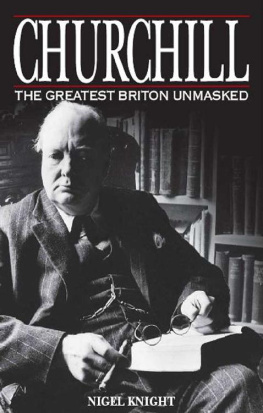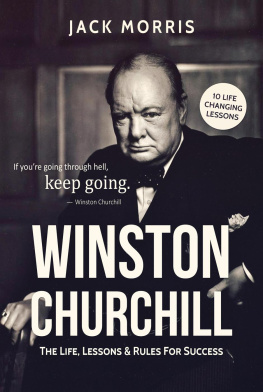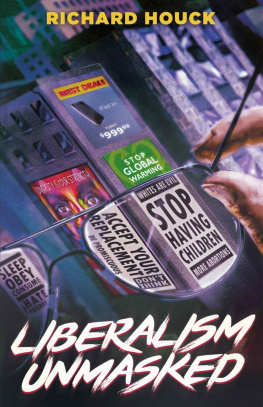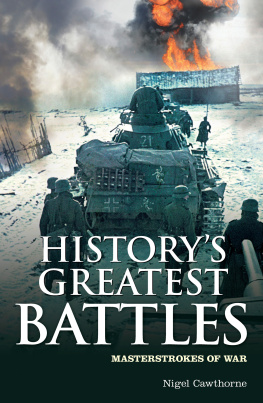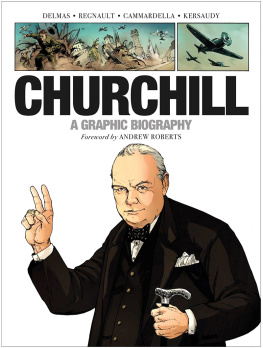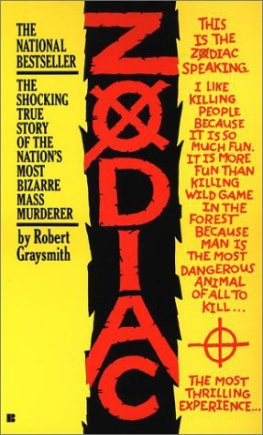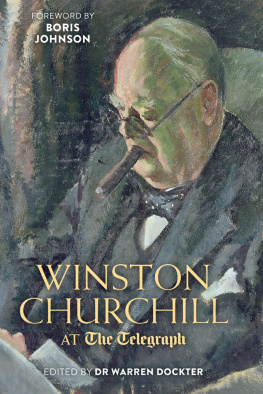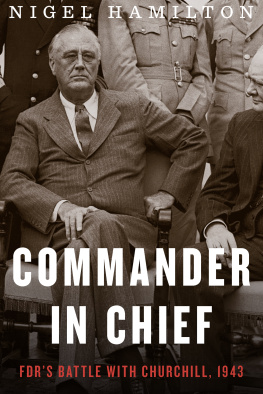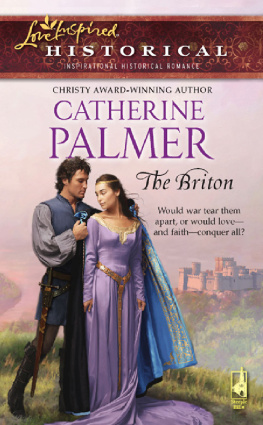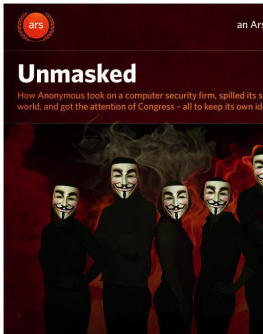Nigel Knight - Churchill: The Greatest Briton Unmasked
Here you can read online Nigel Knight - Churchill: The Greatest Briton Unmasked full text of the book (entire story) in english for free. Download pdf and epub, get meaning, cover and reviews about this ebook. year: 0, genre: History. Description of the work, (preface) as well as reviews are available. Best literature library LitArk.com created for fans of good reading and offers a wide selection of genres:
Romance novel
Science fiction
Adventure
Detective
Science
History
Home and family
Prose
Art
Politics
Computer
Non-fiction
Religion
Business
Children
Humor
Choose a favorite category and find really read worthwhile books. Enjoy immersion in the world of imagination, feel the emotions of the characters or learn something new for yourself, make an fascinating discovery.
- Book:Churchill: The Greatest Briton Unmasked
- Author:
- Genre:
- Year:0
- Rating:3 / 5
- Favourites:Add to favourites
- Your mark:
- 60
- 1
- 2
- 3
- 4
- 5
Churchill: The Greatest Briton Unmasked: summary, description and annotation
We offer to read an annotation, description, summary or preface (depends on what the author of the book "Churchill: The Greatest Briton Unmasked" wrote himself). If you haven't found the necessary information about the book — write in the comments, we will try to find it.
Churchill: The Greatest Briton Unmasked — read online for free the complete book (whole text) full work
Below is the text of the book, divided by pages. System saving the place of the last page read, allows you to conveniently read the book "Churchill: The Greatest Briton Unmasked" online for free, without having to search again every time where you left off. Put a bookmark, and you can go to the page where you finished reading at any time.
Font size:
Interval:
Bookmark:

CHURCHILL
THE GREATEST BRITON UNMASKED
CHURCHILLTHE GREATEST BRITON UNMASKED
NIGEL KNIGHT

For Sally, Vic, Joy, Ernie and Iris
A DAVID & CHARLES BOOK
Copyright David & Charles Limited 2008
David & Charles is an F+W Publications Inc. company
4700 East Galbraith Road
Cincinnati, OH 45236
First published in the UK in 2008
Text copyright Nigel Knight 2008
Photography see picture credits (page 380)
Nigel Knight has asserted his right to be identified as author of this work in accordance with the Copyright, Designs and Patents Act, 1988.
All rights reserved. No part of this publication may be reproduced, stored in a retrieval system, or transmitted, in any form or by any means, electronic or mechanical, by photocopying, recording or otherwise, without prior permission in writing from the publisher.
A catalogue record for this book is available from the British Library.
ISBN-13: 978-0-7153-2855-2 hardback
ISBN-10: 0-7153-28557-8 hardback
Printed in Finland by WS Bookwell,
for David & Charles
Brunel House, Newton Abbot, Devon
Commissioning Editor: Neil Baber
Editorial Manager: Emily Pitcher
Editor: Verity Muir
Art Editor: Martin Smith
Designer: Joanna Ley
Project Editor: Beverley Jollands
Production Controller: Kelly Smith
Visit our website at www.davidandcharles.co.uk
David & Charles books are available from all good bookshops; alternatively you can contact our Orderline on 0870 9908222 or write to us at FREEPOST EX2 110, D&C Direct, Newton Abbot, TQ12 4ZZ (no stamp required UK only); US customers call 800-289-0963 and Canadian customers call 800-840-5220.
Churchill was aristocratic, high-handed, self-centred, energetic, impatient, inconsistent, prone to rhetoric, had great presence and was most stubborn. He was brilliant but unsound. This being so, why is he considered by so many to be the Greatest Briton? His reputation stems from his warnings about German rearmament in the 1930s and his opposition to the British policy of appeasement a policy that failed to prevent war: this made him appear a great visionary, able to see what others could not. It also rests on his most memorable speeches and, as Prime Minister in World War II, on his identification with victory. All this was helped considerably by the fact that he wrote some of the history of the period himself.
Churchills early development holds the key to understanding his later actions. He adored his temperamental bully of a father, Lord Randolph, who constantly chastised him. He was dispatched to a preparatory school at the age of seven and suffered at the hands of its sadistic headmaster. These experiences could easily have broken him, but instead he became rebellious and obstinate. At 13 he entered Harrow School; in his academic work he was good at English and little else, but he loved the Cadets and became a good fencer. He instructed the headmaster in how to do his job and was birched repeatedly, but the propensity to instruct those more expert than himself was a trait that would remain with him. Churchill followed his fathers political career with enthusiasm and inherited his inconsistencies which would have dire consequences in his own career. He entered the military academy, Sandhurst, at his third attempt, but gained entry only to the cavalry rather than the intellectually more demanding infantry. At Sandhurst he learned the need for quick decisions and spirited fighting, qualities that he would exhibit much later in his approach to mechanized warfare. He also learned to enjoy himself and to spend money he didnt have.
In 1895 Churchill endured the deaths of both his father and his childhood nurse, to whom he had been very attached as his American mother, Jennie, had ignored him. These experiences hardened his character and convinced him that his life would not be a long one. Ruthlessly exploiting the former position of his father and the current one of his mother in order to further his own career, he established high-ranking political contacts, was inducted into New York society and saw his first military action in Cuba. Here, to his delight, he was shot at for the first time on his 21st birthday and acquired a penchant for fine cigars and a daily siesta, which enabled him to work long into the night.
Churchills military service would be marked by impetuosity and glory-seeking. He acted as both a war correspondent and a military officer suppressing Afghan tribesmen on the North-West Frontier, where he took foolhardy risks but also displayed great bravery. His bumptiousness became increasingly unpopular with the military hierarchy, and when he sought to join Lord Kitcheners expedition to the Sudan his overtures were resisted but he insisted and went anyway. He wrote accounts of these military actions, indicating what his superiors should have done, that were concerned less with the facts and more with his own interpretation of events. Then he fought a by-election at Oldham on the back of his exploits, which he lost.
By the turn of the century the Boer War had begun in South Africa, and Churchill was anxious to be in the thick of it as a newspaper reporter, a status that did not prevent him from actively engaging in the shooting war. He was captured and made a risky escape, thanks rather more to luck than to judgment. He was hailed as a hero, became an officer in the South African forces and used his newfound fame to enter Parliament as member for Oldham in 1900. He immediately set off for a lecture tour in North America, where he met President McKinley. In Parliament he alienated his Conservative colleagues by taking up the issue that had prematurely terminated his fathers political career while Chancellor of the Exchequer military expenditure.
All the qualities Churchill exhibited in his early career would be very apparent when he was granted high political office. The first infamous episode was the Gallipoli campaign during World War I, where he sought to break the stalemate on the Western Front with a disastrous assault on Turkey, the most inconsequential member of the Central Powers. The principal characteristics of this adventure recurred several times in World War II, most notably in the campaigns in Norway, North Africa, the Balkans and Italy Italy being the soft underbelly of Europe in Churchills words, or the tough old gut as US Lieutenant-General Mark Clark more accurately called it.military campaign in Sumatra, to the detriment of the war effort. These were dispersionist campaigns, attacking the enemy at its periphery. A direct and decisive assault was always avoided; instead military efforts were undertaken against objectives of little direct strategic importance. The strategy assumed that the enemy would not offer appreciable resistance if attacked in this way an assumption clearly refuted by the actual resistance met by all these campaigns.
It was the defeat of Germany and AustriaHungary on the Western Front in World War I that caused the Ottoman Empire to collapse, not the other way around. Similarly, in World War II the defeats of German forces in Norway, North Africa, the Balkans and Italy were not of vital importance to the defeat of Germany, whereas defeating Germany by a direct assault led to the collapse of German forces in those countries. The outcome of World War II in Europe was decided principally by the Soviets on the Eastern Front and by the Western Allies conducting a Second Front in France, not by Churchills peripheral campaigns, for which Gallipoli, the most infamous, had set the paradigm.
Font size:
Interval:
Bookmark:
Similar books «Churchill: The Greatest Briton Unmasked»
Look at similar books to Churchill: The Greatest Briton Unmasked. We have selected literature similar in name and meaning in the hope of providing readers with more options to find new, interesting, not yet read works.
Discussion, reviews of the book Churchill: The Greatest Briton Unmasked and just readers' own opinions. Leave your comments, write what you think about the work, its meaning or the main characters. Specify what exactly you liked and what you didn't like, and why you think so.

